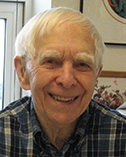

|
Primary Section: 44, Microbial Biology Secondary Section: 63, Environmental Sciences and Ecology Membership Type:
International Member
(elected 2014)
|
 Copyright © 2024 National Academy of Sciences. All rights reserved.
Privacy Statement | Institutional Policies and Procedures | Terms of Use
Copyright © 2024 National Academy of Sciences. All rights reserved.
Privacy Statement | Institutional Policies and Procedures | Terms of Use
